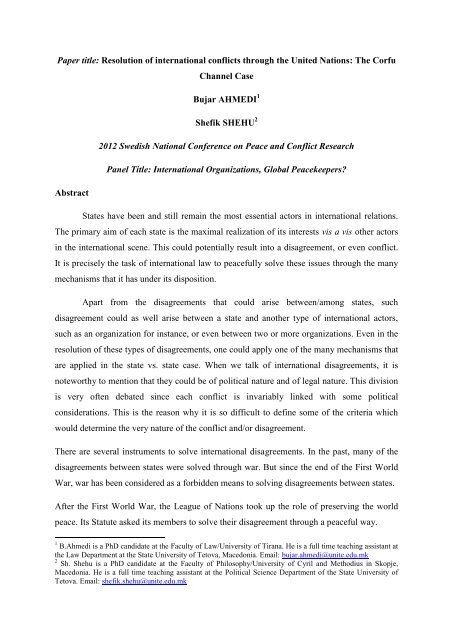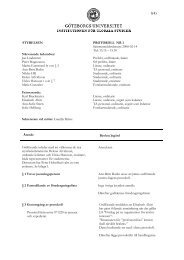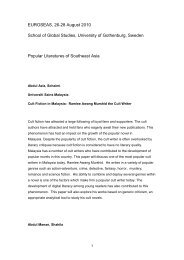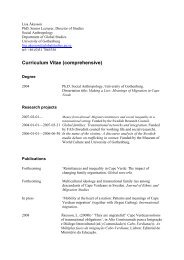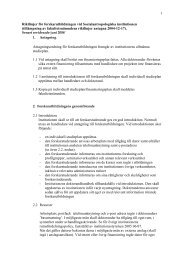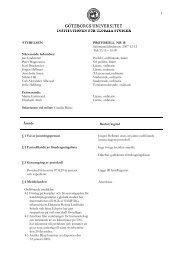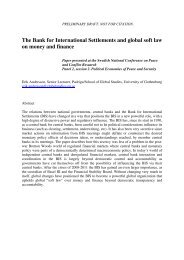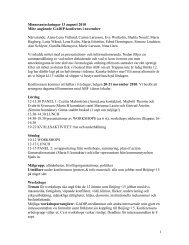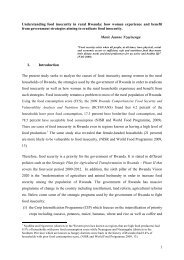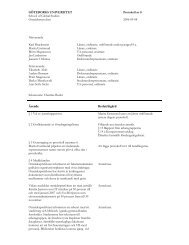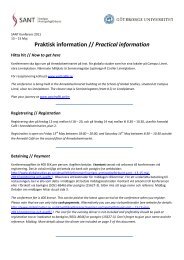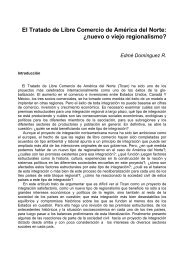The Corfu Channel Case Bujar AHMEDI Shefik SHEHU
The Corfu Channel Case Bujar AHMEDI Shefik SHEHU
The Corfu Channel Case Bujar AHMEDI Shefik SHEHU
Create successful ePaper yourself
Turn your PDF publications into a flip-book with our unique Google optimized e-Paper software.
Paper title: Resolution of international conflicts through the United Nations: <strong>The</strong> <strong>Corfu</strong><br />
<strong>Channel</strong> <strong>Case</strong><br />
<strong>Bujar</strong> <strong>AHMEDI</strong> 1<br />
<strong>Shefik</strong> <strong>SHEHU</strong> 2<br />
2012 Swedish National Conference on Peace and Conflict Research<br />
Panel Title: International Organizations, Global Peacekeepers?<br />
Abstract<br />
States have been and still remain the most essential actors in international relations.<br />
<strong>The</strong> primary aim of each state is the maximal realization of its interests vis a vis other actors<br />
in the international scene. This could potentially result into a disagreement, or even conflict.<br />
It is precisely the task of international law to peacefully solve these issues through the many<br />
mechanisms that it has under its disposition.<br />
Apart from the disagreements that could arise between/among states, such<br />
disagreement could as well arise between a state and another type of international actors,<br />
such as an organization for instance, or even between two or more organizations. Even in the<br />
resolution of these types of disagreements, one could apply one of the many mechanisms that<br />
are applied in the state vs. state case. When we talk of international disagreements, it is<br />
noteworthy to mention that they could be of political nature and of legal nature. This division<br />
is very often debated since each conflict is invariably linked with some political<br />
considerations. This is the reason why it is so difficult to define some of the criteria which<br />
would determine the very nature of the conflict and/or disagreement.<br />
<strong>The</strong>re are several instruments to solve international disagreements. In the past, many of the<br />
disagreements between states were solved through war. But since the end of the First World<br />
War, war has been considered as a forbidden means to solving disagreements between states.<br />
After the First World War, the League of Nations took up the role of preserving the world<br />
peace. Its Statute asked its members to solve their disagreement through a peaceful way.<br />
1 B.Ahmedi is a PhD candidate at the Faculty of Law/University of Tirana. He is a full time teaching assistant at<br />
the Law Department at the State University of Tetova, Macedonia. Email: bujar.ahmedi@unite.edu.mk<br />
2 Sh. Shehu is a PhD candidate at the Faculty of Philosophy/University of Cyril and Methodius in Skopje,<br />
Macedonia. He is a full time teaching assistant at the Political Science Department of the State University of<br />
Tetova. Email: shefik.shehu@unite.edu.mk
After the Second World War, such a task was inherited by the organization of the United<br />
Nations, being a key principle in the UN Charter.<br />
Since the key goal of international law is preserving and promoting peace and cooperation<br />
among states, this paper will focus on resolution of disagreements through the organization of<br />
United Nations while shedding specific light to the <strong>Corfu</strong> channel case.<br />
Keywords: <strong>Corfu</strong> <strong>Channel</strong>, peace, conflict resolution, ICJ, UN, international law
Resolution of international conflicts through the United Nations: <strong>The</strong> <strong>Corfu</strong> <strong>Channel</strong><br />
<strong>Case</strong><br />
Introduction<br />
<strong>The</strong> <strong>Corfu</strong> <strong>Channel</strong> <strong>Case</strong> is one of the most important cases resolved by the ICJ since<br />
its creation because it dealt with a lot of important issues such as freedom of the sea, the right<br />
of passage through straits, sovereignty, intervention, self-help measures, the responsibility of<br />
states, compensation. 3<br />
Being a case of great importance, shown not only by the fact that the case was solved<br />
by the ICJ but also an important case for international law itself handled by lawyers, political<br />
scientists, many historians and other scholars.<br />
<strong>The</strong> fact that since 1990 until 2010 this case was treated in about 60 articles that were<br />
published in various journals with the <strong>Corfu</strong> <strong>Channel</strong> Incident as the main theme confirms<br />
that this case was of a very special character.<br />
Among Albanian authors who have addressed this issue either directly or indirectly<br />
we can mention Arben Puto, Zejnulla Gruda, Ksenofon Krisafi, Paskal Milo, etc... 4 Besides<br />
having aroused the curiosity of the Albanian authors to study this case, it was treated by<br />
foreign authors as well. 5<br />
<strong>The</strong> <strong>Corfu</strong> <strong>Channel</strong> Incident originates since May 15 th 1946, when two British<br />
warships, ORION and SUPERB passed the north part of the <strong>Corfu</strong> <strong>Channel</strong> were fired on by<br />
the Albanian battery. Arben Puto, in his book International Public Law, emphasizes that the<br />
British ships sailed without a raised flag, and the firing of the Albanian coastal batteries was<br />
to gain the attention of the warships to raise their flag and make their affiliation known. 6<br />
According to the official Albanian position, the Albanian coastal battery fired as a sign of<br />
warning around the ships. Only after that they raised the British flag and the Albanian coastal<br />
artillery stopped shooting. 7 According to the official British position, the passage was<br />
3 Gruda, Z (2002). E drejta ndërkombëtare publike. Universiteti I Prishtinës. Prishtinë. P. 445.<br />
4 Arben Puto. E drejta ndërkombëtare publike; Zejnulla Gruda. E drejta ndërkombëtare publike; Ksenofon<br />
Kristafi. Në kërkim të arit. Paskal Milo. Të Vërtetat e fshehura- Incidenti i Kanalit të Korfuzit.<br />
5 Il Yang Chung. Legal Problems involved in the <strong>Corfu</strong> <strong>Channel</strong> Incident; Eric Leggett. <strong>The</strong> <strong>Corfu</strong> Incident.<br />
6 Puto, A (2008). E drejta ndërkombëtare publike. Tiranë. P. 454<br />
7 Information obtained from the Archives of the Ministry of Foreign Affairs. Efforts in establishing diplomatic<br />
relations with England, Dossier No. 25, p.62, 1946 yr.
peaceful. 8 After this event, Albania and England exchanged notes which resulted in<br />
completely opposite positions. Albania considered that foreign warships had no right to pass<br />
through Albanian territorial waters without prior authorization. <strong>The</strong> British position was<br />
different; they stated that their and other states’ warships had the right to an innocent or<br />
peaceful passage. According to the British position, the <strong>Corfu</strong> <strong>Channel</strong> is considered an<br />
international channel, and therefore no state neither England had the need for a passage<br />
permission.<br />
<strong>The</strong> incident on May 15 th 1946 will worsen the Anglo-Albanian relations.<br />
<strong>The</strong> case<br />
After the incident of 15 May 1946, the two governments launched a series of actions.<br />
<strong>The</strong> Albanian government feared the possible revenge military retaliatory actions by the<br />
British Navy. 9 On May 17, 1946 Chairman Spiro Moses declared the command that<br />
prevented the passage of foreign warships and merchant vessels in Albanian territorial waters<br />
without prior notification and authorization by the Albanian authorities. 10 <strong>The</strong> order shall be<br />
communicated to the entire diplomatic troupes in Albania. After the order of 17 May 1946,<br />
the orders of the Ministry of Defense followed which had the same purpose, the safety and<br />
protection of the Albanian coast. <strong>The</strong> fear of the Albanian state by a British invasion will<br />
result in the meeting between the head of the Albanian government of that time, Enver Hoxha<br />
and the Yugoslav government leader, J.B. Tito. <strong>The</strong> meeting would be held in Belgrade on<br />
June 23, 1946. <strong>The</strong>re is no trace in the Albanian archives but crumbs of protocol about what<br />
was discussed at that meeting. 11 But what was discussed at that meeting can be seen in the<br />
letter of the Soviet ambassador in Albania Çuvahin to convey to his foreign minister of the<br />
Soviet Union, Molotov. According to him the two leaders’ meeting addressed several issues<br />
such as: military affairs, the condition of land and marine borders of the Albanian state. After<br />
returning from Belgrade, Enver Hoxha took all measures to strengthen the protection in the<br />
south of the country, especially the coastal protection. 12<br />
In 18 or 19 August, another meeting will be held with the two leaders, Albanian and<br />
Yugoslav. This time the meeting will be held in Bled, Slovenia. <strong>The</strong>re is no document that<br />
8 PRO. 1946. FO 371/58492<br />
9 Milo, P (2010).Të vërtetat e fshehura -Incidenti i Kanalit të Korfuzit. Toena. Tiranë. p. 68.<br />
10 ibid<br />
11 Milo, P (2010).Të vërtetat e fshehura -Incidenti i Kanalit të Korfuzit. Toena. Tiranë. p. 88.<br />
12 ibid
shows in detail about what was discussed at this meeting. According to professor Pascal<br />
Milo, this meeting was focused on the scenario of placing mines in the <strong>Corfu</strong> <strong>Channel</strong>. 13<br />
After the meeting in Bled, on August 29, the chief of the Yugoslav Army, Lieutenant<br />
General Koça Popovic sent a letter to the Ministry of National Defense in which he indirectly<br />
implied that the Yugoslav side expressed readiness to carry out the mining of the Albanian<br />
territorial waters in the name of their clearance. This mode was designed to preserve the<br />
secrecy of the operation. 14<br />
On September 6, the Albanian Majesty accepts the proposal, only requires to be<br />
informed a few days before the Yugoslav Marine combat units leave for the Albanian ports<br />
with the aim of taking measures. 15<br />
<strong>The</strong> mining of Albanian territorial waters on the southern coast and in the <strong>Corfu</strong><br />
<strong>Channel</strong> was done on the night of 18 September 1946. <strong>The</strong> mission itself was confidential,<br />
and therefore such an action was decided to be carried out at night. <strong>The</strong> process of mining<br />
was conducted by the Yugoslav federation with the participation of an Albanian officer. 16<br />
<strong>The</strong> secret of mining the territorial waters in the autumn of 1946 was known to a very<br />
limited circle of people as Enver Hoxha, Mehmet Shehu, Bedri Spahiu, Hysni Kapo, Koçi<br />
Xoxe, Kristo <strong>The</strong>melko, Nako Spiru and other leaders of that time. 17<br />
For the Englishmen, the incident of 15 March 1946 that occurred in the <strong>Corfu</strong><br />
<strong>Channel</strong> was considered a severe wound to the English national pride and its Navy. Carried<br />
out by a small country such as Albania, this action could not be easily accepted from the<br />
English state. In this regard as a return to Albania what happened on March 15, 1946,<br />
England made a secret operation code-named XCU, on October 5, associated with the<br />
operations plan of October 13, code-named XCUI, which meant "Training <strong>Corfu</strong>”. 18 <strong>The</strong><br />
British secret plan was actually prepared to provoke the Albanian state.<br />
On October 21 the preparations for operation XCU were completed. It was planned<br />
that during this day the ships were to conduct the operation in the <strong>Corfu</strong> <strong>Channel</strong>. <strong>The</strong> British<br />
considered this day and date as very important since it corresponded with the famous victory<br />
13 Ibid, p. 92.<br />
14 Ibid<br />
15 Ibid<br />
16 Ibid, p 94.<br />
17 Ibid.<br />
18 Milo, P (2010).Të vërtetat e fshehura -Incidenti i Kanalit të Korfuzit. Toena. Tiranë. p. 97.
of the English Royal Navy of 1805. <strong>The</strong> plan foresaw that the operation would last one hour.<br />
<strong>The</strong> plan would be secret and even the Greek state was advised to keep it a secret, which was<br />
informed for such an operation. On October 22, four British cruisers and destroyers came<br />
from the port of <strong>Corfu</strong> and took direction from the northern part of the <strong>Corfu</strong> <strong>Channel</strong>. On<br />
this date, what was foreseen in the British operation will not happen. During the cruise, one<br />
of the British destroyers, the Samuarez, struck a mine and was gravely damaged. <strong>The</strong> other<br />
destroyer, the Voltage, when sent to assists Saumarez, struck another mine and was also<br />
seriously damaged. This incident is regarded as second in the <strong>Corfu</strong> <strong>Channel</strong> which was also<br />
a tragedy for the English because 44 British sailors were killed and 42 were injured without<br />
calculating material damages. <strong>The</strong> Albanian Coast Guards will help the British authorities,<br />
but they will refuse the aid offered by the Albanian state.<br />
This case was more severe than the case of 15 May that is why the British tried to<br />
carefully administer it from the beginning. It is worth mentioning that in relations with the<br />
public they carefully communicated a statement to the public on October 23 in which they<br />
expressed regret for the British ships mine damaging in the north-east of the <strong>Corfu</strong> <strong>Channel</strong>,<br />
reported the victims and promised further information as soon as possible. 19<br />
Several days later they will address Albania in informing about a mine cleaning action<br />
which they will conduct in the <strong>Corfu</strong> <strong>Channel</strong>. According to them the mine cleaning in the<br />
<strong>Corfu</strong> <strong>Channel</strong> would begin once England got the approval of the Central Committee of mine<br />
clearance with headquarters in Cairo.<br />
<strong>The</strong> Albanian Government will reject the proposal of England, because the operation<br />
was had not foreseen the participation of the Albanian authorities. <strong>The</strong> Albanian state<br />
proposed a creation of a joint commission that will clear the mines in the <strong>Corfu</strong> <strong>Channel</strong>. This<br />
proposal will not be accepted by the British state and the Albanian state will inform the UN<br />
through a telegram of protest on October 30, 1946. <strong>The</strong> UN did not show any reaction or<br />
particular interest regarding the telegram sent by the Albanian state.<br />
On 12 and 13November, 1946 England will start the operation to clear the mines in<br />
the <strong>Corfu</strong> <strong>Channel</strong>. On November 14, 1946 the Central Committee of mine clearance will<br />
openly announce that the operation undertaken by England on 12 and 13 November was not<br />
19 Gardiner, L (1966). <strong>The</strong> eagle spreads his claws. A history of the <strong>Corfu</strong> <strong>Channel</strong> dispute and of Albania's<br />
relations with the West, 1945-1965, Blackwood, London p. 97.
given any authorization. Thus, the mine clearing operation in the <strong>Corfu</strong> <strong>Channel</strong> was<br />
conducted without the authorization of this committee.<br />
On December 3, 1946 the British government will address the Albanian government<br />
with a note, through which the Albanian government will be informed on completion of the<br />
sweeping operation in the <strong>Corfu</strong> <strong>Channel</strong> and hereby the same note will emerge the claims<br />
towards the Albanian government. According to the British government during the operation<br />
in question, in the <strong>Corfu</strong> <strong>Channel</strong> a total of 22 mines were found, two of which were sent to<br />
the British naval base in Malta, to develop an expertise. <strong>The</strong> note also stated that through the<br />
expertise it was concluded that the mines were placed not earlier than 6-7 months before the<br />
incident and were of German production. In the note they explained that the <strong>Corfu</strong> <strong>Channel</strong><br />
was cleaned once after the war and given the fact that they had reached the conclusion that<br />
the mines were placed by the Albanian government, or at least the Albanian government<br />
should have been aware of the placement of mines. Given this fact by the English<br />
government, Albania should apologize to England and give compensation, as for victims and<br />
the state for damages suffered in the incident October 22, 1946. So these were the English<br />
claims.<br />
<strong>The</strong> English note ended with the allegations that if the Albanian government will not<br />
accept the demands of the English party, the English side will issue for examination by the<br />
UN and the Security Council.<br />
After analyzing the English note, and after appropriate consultations with the<br />
Yugoslav state on December 14 sent a brief note to the British party. As the English note to<br />
the Albanian government was very harsh for the Albanian side, the Albanian government had<br />
given a very brief response stating that the Albanian government was examining the British<br />
note, but was not ready to give a response to the British party within the deadline set by the<br />
English government in the note on 3 December, 1946. Indeed, the Albanian government<br />
attempted to tacticize by delaying its response. <strong>The</strong> British Government will not wait more<br />
and on December 18 will deliver another note which stated: "If his Majesty's Government<br />
does not receive a satisfactory response to the note sent to the Albanian government ..., the<br />
deadline set in this note, which is midnight of 23 December, as stated earlier would refer the<br />
matter to the UN Security Council.” 20<br />
20 PRO. 1946. FO 371/58497
<strong>The</strong> English note was examined very carefully by the Albanian authorities and on<br />
December 23 it will respond to the English government through a different note, but this time<br />
longer than the previous one. In the note they stated that Albania at that time did not have<br />
tools for placing and removing mines. Given this fact, while Albania had no tools, cannot be<br />
accused of placing mines in the <strong>Corfu</strong> <strong>Channel</strong>. To avoid accusations of knowing about the<br />
mine placement, the Albanian government suggested that the mines in the <strong>Corfu</strong> <strong>Channel</strong><br />
could have been set by the Greek state.<br />
After the response given by the Albanian government in which the participation of<br />
Albania in the mine deployment was rejected and its knowledge of who might have placed<br />
the mines, the British state was enforced to deliver the case to the UN Security Council.<br />
In January 1947, England will submit the matter to the UN Security Council. In<br />
accordance with Article 35 of the UN Charter 21 , England required the Security Council to<br />
discuss Albania's responsibility for the <strong>Corfu</strong> <strong>Channel</strong> incident. 22<br />
SC began the review of the English request on February 18, 1947. <strong>The</strong> Albanian Party<br />
in the SC was represented by Hysni Kapo and Kahriman Ylli, while the British side by<br />
Alexander Kadogan.<br />
In the UN Security Council, the first party that featured positions regarding the<br />
incident in the <strong>Corfu</strong> <strong>Channel</strong> was the English one. <strong>The</strong> English side once again reaffirmed its<br />
position known earlier that the responsibility for the incident belongs to the Albanian party.<br />
<strong>The</strong>y also confirmed that the mines were placed six months or less in secret and that the<br />
incident was a serious international crime and that their placement without notice constituted<br />
a crime against humanity.<br />
<strong>The</strong> Albanian party rejected the English accusations. According to the Albanian<br />
representative Hysni Kapo, the British had no evidence in the charge raised against Albania<br />
and that his country would never commit such act against a country with which it was an ally<br />
21 Article 35 of UN Charter, paragraph 1, states that: Any Member of the United Nations may bring any dispute,<br />
or any situation of the nature referred to in Article 34, to the attention of the Security Council or of the General<br />
Assembly. All Members of the United Nations, in order to contribute to the maintenance of international peace<br />
and security, undertake to make available to the Security Council, on its call and in accordance with a special<br />
agreement or agreements, armed forces, assistance, and facilities, including rights of passage, necessary for the<br />
purpose of maintaining international peace and security.<br />
22 PRO. 1947. FO. 371/66884.
in the war. 23 He also stated that the entry of British warships in the territorial waters of<br />
Albania without notice and in war formation constituted a violation of the territorial<br />
sovereignty of Albania. 24<br />
Further examination on the <strong>Corfu</strong> <strong>Channel</strong> incident by the SC went on to establish a<br />
commission of inquiry, composed of one representative of Australia, Colombia and Poland.<br />
<strong>The</strong> Commission drafted two reports: one designed by the representative of Colombia and<br />
Australia who favored the English side, and another report drafted by the representative of<br />
Poland to favor the Albanian side. It is worth noting that in the SC debate on this issue most<br />
states inclined the conclusion to make Albania responsible for the incident. After several<br />
sessions of SC, on March 25, 1947, the SC will pronounce itself on the issue. In the debate<br />
that followed in the SC, it became apparent that representatives of the western countries<br />
inclined towards the England conclusion of accusing Albania as responsible. 25 It was the<br />
Soviet Union that opposed such a position in the SC.<br />
Court Proceedings at the International Court of Justice<br />
After the veto of the Soviet Union, on April 3, under Article 36 of the Charter of the<br />
UN Security Council, England will present a new resolution-project which proposed that the<br />
Security Council should recommend the parties to address the ICJ, to solve this conflict in<br />
judicial proceedings.<br />
Found in an unfavorable situation for England after the Soviet veto, England will<br />
present a different resolution-project to the SC on March 3, 1947. On March 9, 1947 the SC<br />
will adopt this resolution, which recommended that the parties choose the conflict between<br />
them in the ICJ.<br />
After the Security Council resolution, the English began making preparations to send<br />
the case to the ICJ. For the preparation of the request that will be brought before the ICJ and<br />
to follow the process that would begin a team was assigned led by Eric Becket and the<br />
General Prosecutor Harley Shoukros.<br />
23 Kapo, H (1980). Volume I. 8 Nëntori. Tiranë.<br />
24 Ibid.<br />
25 Puto, A. (2008). E drejta ndërkombëtare publike. Tiranë. p. 459.
On May 22 the English will officially present the case to the ICJ. <strong>The</strong> request to<br />
petition the English case to the ICJ was based on Article 40 26 of the Statute of the ICJ. In fact,<br />
this was a unilateral action of the English party, because under the Statute of the ICJ, a<br />
prerequisite to a court for review of a dispute is the agreement of the parties concerned which<br />
in this case did not exist. According to the English party, the court had jurisdiction to review<br />
the case and argued that by referring to the Resolution of the Security Council which had<br />
decided that the parties should resolve the conflict between them in the ICJ, that the Albanian<br />
government had accepted the requirement of the Security Council to accept all obligations as<br />
a member of the UN when they accepted the invitation to take part in the discussions that<br />
took place in the SC on the matter, and that UN members must accept the decisions of the<br />
Security Council in accordance with the UN Charter.<br />
ICJ, after accepting the English request shall notify the Albanian party that the<br />
English side had filed a suit against them.<br />
On July 2, 1947, the Albanian side would respond to the Court through a letter<br />
addressed to it. First of all, it emphasized that the British government had acted in violation<br />
of the Statute of the Court, that the procedure followed by it was illegal. However, the<br />
Albanian government "in this matter felt itself pretty confident", so it was ready to appear<br />
before the ICJ, having in mind the English side’s terms of violation. 27<br />
After receiving this response from the Albanian side, the ICJ will officially begin to<br />
examine the <strong>Corfu</strong> <strong>Channel</strong> case. Since the procedure before the ICJ is conducted in two<br />
phases, written and verbal stage, the Court set deadlines for submission of documents by the<br />
parties. On October 1, 1947 the English side had to present the documentation to the Court,<br />
whereas the Albanian side had to do this on December 10, 1947.<br />
Under the term fixed by the Court, on October 1, 1947 the English side will present its<br />
documents to the Court. On December 9, the day before Albania submits the documentation<br />
to the Court, according to Professor Puto will make a "preliminary objection". With this the<br />
Albanian government will return to the issue raised in the letter since the beginning of July<br />
addressed to the ICJ, thus the procedural violations of the English government. Albania<br />
26 Article 40 of the UN chárter says that: <strong>Case</strong>s are brought before the Court, as the case may be, either by the<br />
notification of the special agreement or by a written application addressed to the Registrar. In either case the<br />
subject of the dispute and the parties shall be indicated.<br />
27 Puto, A. (2008). E drejta ndërkombëtare publike. Tiranë. p. 460.
equested that the ICJ should state that the English claim was "unacceptable" and that the<br />
Court was not competent to review the matter without prior agreement between the parties. 28<br />
After this action of the Albanian side, ICJ will suspend the court procedure related to<br />
this case, so that it could put a deadline for the English side, January 20 1948, so they could<br />
bring a written statement related to their grievances in relation to the action that the Albanian<br />
side undertook on 9 December 1947. 29<br />
On January 19, 1948 the British side will present its objections to the Court, where they will<br />
argue the compromise between the two governments as a condition for accepting the<br />
jurisdiction of the Court asked by the Albanian side should not have been taken into<br />
consideration. 30<br />
Once the actions of the two governments, Britain and Albania were completed, on<br />
February 26, 1948, the first court hearing on the case will start. This will be the first court<br />
session of the ICJ, from when it was inaugurated as one of the main organs of the UN.<br />
<strong>The</strong> case was to be judged by 16 judges from different countries, we will mention<br />
here: Acting Chairman Guerrero, President Basdevant, Judges: Alvarez, Fabel, Hackworth,<br />
Winiarski, Zorieic. De Visscher, Sir Arnild McNair, Klaestad, Badawi Pasha. Krylov, Read,<br />
Hsu Mo, Azevedo. Invoking the Statute of the ICJ, Albania was entitled to appoint an ad hoc<br />
judge. As ad hoc judge will be appointed Daxner. 31<br />
It is important to note that both sides had made their preparations and their teams<br />
were created to defend the case before the ICJ. Albania in the quality of the agent had given<br />
Ylli Kahreman, who was then Ambassador of Albania in Paris, while in the capacity of the<br />
lawyer was appointed the Czechoslovak Vahosh. On the other hand the English side was<br />
represented by Eric Becket, in the capacity of the agent and the Attorney General Shoukros<br />
Harley as a lawyer.<br />
According to the procedure established by the Statute of the ICJ, the Court will first<br />
hear out the "preliminary objection" on the Albanian side, which will be heard by the Court<br />
during the first three sessions in which the Albanian party will present their position, with<br />
28 Ibid,<br />
29 For more see ICJ’s website: Preliminary objection submitted to the Court by the Albanian government on 9<br />
December 1947.<br />
30 For more see ICJ’s website: Observations and submissions of the British government handed to the Court on<br />
January 19 1948..<br />
31 See ICJ’s decision regarding the <strong>Corfu</strong> <strong>Channel</strong> case on April 9 1949.
egards to the complaint presented by the English side. In the three other sessions, the English<br />
side would present their arguments in objection to the Albanian’ sides position.<br />
On March 25, 1948, the ICJ finished examining the issue and made a decision based<br />
on which the preliminary objection of the Albanian side will be rejected. Following this<br />
decision the Court set new deadlines for submission of documents by the parties. According<br />
to these new deadlines, Albania had to submit its counter-memorandum until September 15,<br />
1948 and on September 28 1948; the English side would present their objections.<br />
After the Court announced the decision, on the very same day on March 25, K. Ylli<br />
and Becket informed the Court, that they had signed a compromise agreement on behalf of<br />
their respective governments, to bring to trial the issue of the <strong>Corfu</strong> <strong>Channel</strong> incident. It<br />
contained two points in the form of two separate questions that were being put forth to the<br />
International Court of Justice:<br />
1. Is Albania responsible under international law, for bombings that occurred on<br />
October 22, 1946 in Albanian waters, and also for the human losses that<br />
followed? And if so, does this present a case for reparations?<br />
2. Has Great Britain, based on the international law, violated the sovereignty of<br />
the People's Republic of Albania with the undertaken military action by the<br />
British Navy in Albanian waters on October 22, 1946, and in 12 of 13<br />
November 1946, and is there any place to give her satisfaction? 32<br />
<strong>The</strong> agreement of compromise was a favor of the Albanian since it considered that the<br />
Court cannot review the matter without a compromise agreement between the parties as a<br />
condition for accepting the jurisdiction of the Court. On the other hand the decision of the<br />
Court dismissed the preliminary objection of Albania constituted a disadvantage for the<br />
Albanian side. It is important to note that the reasons for such a decision by the Court were a<br />
result of the Albanian government's letter to the Court, dated July 2, 1947 which stated that<br />
the Albanian government "felt herself in this matter very confident", so it was very much<br />
ready to appear before the ICJ, which actually implied the acceptance of the Court’s<br />
jurisdiction. This clearly shows that the Government did not have a well prepared team that<br />
would present the case before the Court.<br />
32 Milo, P (2010).Të vërtetat e fshehura -Incidenti i Kanalit të Korfuzit. Toena. Tiranë. pp. 197-198.
While analyzing their weaknesses, the Albanian side would continue to strengthen the<br />
team and mitigate whatever disadvantage so that they could proceed with the case at the ICJ.<br />
In this regard, it will engage the renowned French lawyer Pierre Cot, professor of<br />
international law and outstanding personality of French politics. Part of the Albanian side<br />
would also become Nordman Joe, Marc Jacquier and Paul Villard. This panel of attorneys<br />
would represent the Albanian side in the Court. <strong>The</strong> Albanian side will also engage<br />
consultants, renowned experts of mines, so it could appear before the Court with dignity.<br />
After signing the Compromise agreement on June 15, the Albanian side will put<br />
forward to the Court its Reminder, through which it would lay out all the facts against the<br />
English charges. <strong>The</strong> Reminder stated that: "<strong>The</strong> Albanian government has never laid mines<br />
in the waters of Saranda or elsewhere after 15 May 1946 or before that date, and never had<br />
knowledge of such action." <strong>The</strong> Reminder also attempted to argument the actions undertaken<br />
by the Albanian side with respect to the incident at the <strong>Corfu</strong> <strong>Channel</strong>. It stated that on 22<br />
October 1946, British military vessels had entered the Albanian coastal waters in the war<br />
lineup and did not correspond with the British position that the transition was peaceful.<br />
On July 30 1948, the English side will respond to the Albanian’s Reminder letter with<br />
a Counter-Reminder that would be delivered to the Court. She would try to weaken the<br />
position of Albania before the Court. It will urge Albania "to shed light on the circumstances<br />
in which the two Yugoslav warships, Miljet and Meljine who were loaded with the German<br />
contact mines type Y, sailed southwards from the port of Sibenik on, or about 18 October<br />
1946, and continued toward the <strong>Corfu</strong> <strong>Channel</strong>". 33 <strong>The</strong> British side also stated categorically<br />
that the transition was peaceful and not intended to infringe between inland Albanian waters.<br />
In the Counter-Reminder it was also stated that on 12 and 13 November 1946, Albania’s<br />
sovereignty was never infringed.<br />
On September 20, 1948 the Albanian side will present a Counter-Reminder, to answer<br />
the British Counter-Reminder of 15 to 30 July 1948. In this document, the Albanian side<br />
would once again reiterate its position of 15 June 1948, but will add the issue of why the<br />
English government in its counter-Reminder of 30 July, the Court has not submitted the<br />
documents that dealt with the operations of 22 October 1946. In this regard, the Albanian<br />
party sought from the British side to put at the disposal of the Court all the documents that<br />
33 See ICJ’s website: Reply submitted, under the Order of the <strong>Corfu</strong> of 26 th March, 1948, by the Government of<br />
the United Kingdom of Great Britain and Northern Ireland. 30 July, 1948.
had to do with the trips of the English authorities, their mission on October 22, 1946, cruise<br />
books and journals, set paths, reports and enforcement records of the two destroyers,<br />
Saumarez and Volage. 34<br />
After the Albanian party presented this Counter-Reminder, the ICJ began the public<br />
hearings of the case.<br />
November 9, 1948 will mark the beginning of the public hearings in the Court, with<br />
the English side presenting the case first through her lawyer Shoukros, stating that the<br />
passage of British ships in Albanian territorial waters on October 22, 1946 was a peaceful<br />
transition. In their discussions, the British lawyers will also focus on who should take<br />
responsibility for setting the mines in Albania’s territorial waters, the incurred damages on<br />
the English side and will try to argue that the British ships were transitioning peacefully in<br />
Albanian territorial waters. <strong>The</strong>y will maintain that at no point did they violate the<br />
sovereignty of Albania on October 22, 1946 and thus contending the charges filed by Albania<br />
on 22 October 1946, that the British ships transition was not peaceful, but there was an<br />
operation that was essentially provocative and hostile. 35<br />
<strong>The</strong> Albanian side will start the discussions before the Court on 15 November 1948.<br />
Through attorney Nordman, will object to the theses raised by the English party, stressing<br />
that Albanian could not perform such actions at a time when it had just applied for UN<br />
membership.<br />
Over the course of 16, 17 and 18 November, another attorney will present Albania’s<br />
government positions with respect to the incident. In his speech he would begin with a<br />
statement of the French philosopher of the seventeenth century, Pascal: "Politics has its<br />
reasons which reason knows not of." He stated that "the honor of Albania and perhaps its<br />
national future, its independence, are at stake, because the Albanian government is accused to<br />
have committed an act contrary to international law obligations, but also with humanitarian<br />
laws”. 36 Once he rejected in a very professional way the accusations raised by the English side<br />
before the Court, he demanded that the English side submit all documentation of the four<br />
34 Ibid.<br />
35 For more regarding the testimonies of the British attorneys see ICJ’s website: Minutes of the Sittings held<br />
from November 9th to April 9th, 1949<br />
36 For more regarding the testimonies of the Albanian see ICJ’s website: Minutes of the Sittings held from<br />
November 9th to April 9th, 1949.
English ships as well as the documentation concerning the orders of the English authorities<br />
with regards to their mission on October 22, 1946, records and journals of navigation,<br />
established routes, reports and records of enforcement commanders of the Saumarez and<br />
Volage destroyers. According to Cot, on October 22, 1946 norms of international law were<br />
violated. <strong>The</strong> request for submission of documentation regarding the <strong>Corfu</strong> incident, although<br />
was an undeniable proof that would have probably given another direction to the trial, was<br />
never submitted by the British side.<br />
Cot closed his discussion with rare skills and professionalism. He will address the<br />
Court with the words: "I believe I have proved that England had violated international law by<br />
penetrating into Albanian territory." "It’s not the English people that are sitting before the<br />
Court but the English state. <strong>The</strong> only issue that arises here is not to learn whether the English<br />
nation is a great nation, but simply to learn whether the English acted always in accordance<br />
with the rules of law in the <strong>Corfu</strong> <strong>Channel</strong> case”. 37<br />
From November 22 1948 until December 17 1948, witnesses and experts will appear<br />
before the Court. From the English side, as witnesses were called captains of ships Saumarez<br />
and Volage, Mauritius direction officer, other officers of the English Navy such as<br />
commander Whiteford. Saranda port’s captain Shtino Ali, Commander of Coastal Defence<br />
and former deputy Akile Polena as well as the ex-vice-president of the Executive Committee<br />
of Saranda, Mr. Xhavit Muco were the Albanian side’s witnesses. In the capacity of experts,<br />
the Albanian side would be represented by Captain Oramov and Admiral Mulek. 38<br />
ICJ’s verdict<br />
After listening to expert witnesses, the ICJ withdrew to take the verdict. On April 9,<br />
1949 it gave the verdict. According to this verdict, Albania was responsible for what<br />
happened on October 22, 1946.<br />
<strong>The</strong> Court's verdict will provide answers to the both questions that parties had referred to the<br />
Court with their Compromise agreement of 25 March 1948. Regarding the question: “Is<br />
Albania responsible under international law, for bombings that occurred on October 22, 1946<br />
in Albanian waters, and also for the human losses that followed? And if so, does this present<br />
a case for reparations?” <strong>The</strong> Court responded by stressing that: the government of Albania is<br />
37 ibid<br />
38 Milo, P (2010).Të vërtetat e fshehura -Incidenti i Kanalit të Korfuzit. Toena. Tiranë, pp. 227-228.
esponsible for blasting the mines in the <strong>Corfu</strong> <strong>Channel</strong> on October 22, 1946, because" they<br />
cannot but be aware of who set the mines". This part of the decision was adopted with 11<br />
votes for and 5 against. <strong>The</strong> court also mentioned the issue of reparations. In this question,<br />
the court will not only give an affirmative answer to the question but declared itself<br />
competent to determine the amount of reparations that the Albanian side should give. At this<br />
point the decision was taken with 10 votes for and 6 against. 39<br />
In the second question: Has Great Britain, based on the international law, violated the<br />
sovereignty of the People's Republic of Albania with the undertaken military action by the<br />
British Navy in Albanian waters on October 22, 1946, and in 12 of 13 November 1946, and is<br />
there any place to give her satisfaction?, the Court gave two answers: firstly, with 14 votes<br />
for and two against it said that there had been no violation of territorial sovereignty of<br />
Albania on October 22, 1946, on the day of the mine blasts. It argued this in the light of the<br />
right to passage through international channels, without mentioning whether English<br />
warships performed a demonstration of force. Secondly, the Court unanimously recognized<br />
that on 12-13 December 1946, the English government violated the territorial sovereignty of<br />
Albania, sending its navy to clear mines unilaterally, without the knowledge of the Albanian<br />
authorities. 40<br />
Conclusion<br />
Notwithstanding the fact that Albania considered the Court as incompetent to determine the<br />
amount of reparations, on December 10, 1949, the ICJ set the amount of reparations to<br />
843.947 pounds that Albania had to pay regarding the <strong>Corfu</strong> <strong>Channel</strong> incident. 41<br />
This decision was communicated to the Albanian government which in turn will continuously<br />
challenge the decision of the ICJ.<br />
It'll be the <strong>Corfu</strong> <strong>Channel</strong> incident that will keep the relations between Albania and England<br />
frozen for more than five decades.<br />
Bilateral issues aside, with the verdict on the <strong>Corfu</strong> <strong>Channel</strong> case, the International Court of<br />
Justice, and with that the United Nations, had shown the capacity to impose international law<br />
39 Ibid, p. 463.<br />
40 Puto, A. (2008). E drejta ndërkombëtare publike. Tiranë. p. 463.<br />
41 Ibid
as well as present itself as a credible institution to resolve conflicts of international nature, be<br />
that among its members or beyond.<br />
References<br />
<br />
<br />
<br />
<br />
<br />
<br />
<br />
<br />
Kapo, Hysen (1980). Volume I. 8 Nëntori. Tiranë.<br />
Gardiner, Leslie (1966). <strong>The</strong> eagle spreads his claws. A history of the <strong>Corfu</strong> <strong>Channel</strong><br />
dispute and of Albania's relations with the West, 1945-1965, Blackwood, London<br />
Leggett, Eric (1974). <strong>The</strong> <strong>Corfu</strong> Incident, Seeley Service & Co; 1st ed., London<br />
Il Yang Chung (1959). Legal Problems involved in the <strong>Corfu</strong> <strong>Channel</strong> Incident;<br />
Librairie E Droz, Geneve<br />
Paskal Milo (2010). Të Vërtetat e fshehura- Incidenti i Kanalit të Korfuzit,Botimet<br />
Toena, Tirana<br />
Ksenofon Kristafi (2009). Në kërkim të arit, Dituria, Tirana<br />
Arben Puto (2008). E drejta ndërkombëtare publike, Albin, Tirana<br />
Zejnulla Gruda (2002). E drejta ndërkombëtare publike, Universiteti I Prishtinës.<br />
Prishtinë


